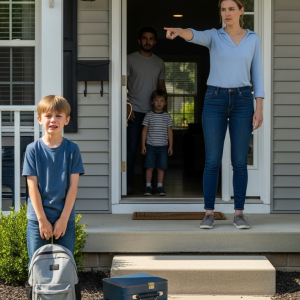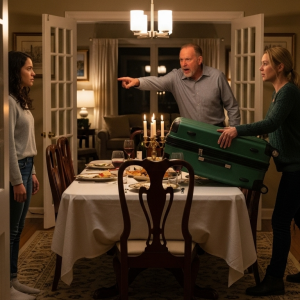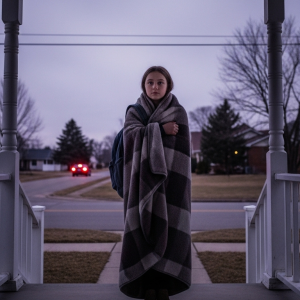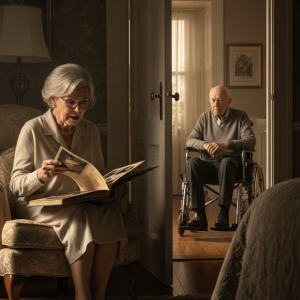From a young age, I understood that I was not a wanted child. My father was a pediatrician, my mother a middle school science teacher. They were brilliant with other people’s children. With their own, they were distant strangers. Our house was not a home; it was a shared space where we coexisted in near silence. Dinners were quiet affairs, each of us retreating to our separate rooms the moment the plates were cleared. There were no shared jokes, no family movie nights, just the hum of the refrigerator and the unspoken agreement to not exist too loudly in each other’s presence.
I learned to stop trying to earn their affection somewhere around middle school. I spoke to them only when necessary. It wasn’t that I didn’t want a relationship; it was that they had made it painfully clear they didn’t want one with me.
The unspoken arrangement shattered on my 18th birthday. They sat me down in the living room, their expressions formal, as if I were a departing employee.
“You’re an adult now,” my father said, his tone devoid of any paternal warmth. “Our legal obligation to you is fulfilled. It’s time for you to be independent.”
“We’re not kicking you out, dear,” my mother added, her voice smooth and practiced. “We’re empowering you.”
I knew what it really was. They wanted me gone. I had planned to take a gap year, to work and save money for college, a dream I knew I would have to fund myself. I found a job at a local supermarket. It didn’t pay much, but the first paycheck I earned felt like a declaration of independence.
My happiness was short-lived. A few weeks later, they dropped the bomb.
“We’re selling the house,” my mother announced over a dinner as silent as all the others. “We’re quitting our jobs to travel the country. It’s a dream we’ve been saving for our entire lives.”
“Now that you have a job and can live on your own,” my father added, “we’re free of our responsibilities.”
I was in a state of shock. I had just started working. I had no savings, no place to go. I would be homeless. I pleaded with them, begged them to wait just a few months, to give me time. They were unmoved.
“We have waited long enough,” my mother said, her voice like ice. “What you do now is your problem, not ours. You are an adult, and we are not responsible for you anymore. As for the house, it’s our property, and we can do whatever we want with it. Where you live is no longer our concern.”
Those were her exact words. The finality of them, the sheer lack of care, ignited something in me. We had the fight of a lifetime. I told them they were terrible people, that I hoped only terrible things happened to them. I cursed them out, the years of quiet resentment finally boiling over. Then, I walked out of that cold house and never looked back.
The problem, I realized as the adrenaline faded, was that I had nowhere to go. My parents had been estranged from their families for years. My friends were all away at college. I was utterly, terrifyingly alone.
So, I took a leap of faith. I called a coworker, a woman two years older than me who ran the makeup department at the supermarket. Her name was Sarah. We had become fast friends, bonding over our shared experiences with difficult parents. Her father was an addict; her mother was wrapped up in herself. She, too, had been supporting herself since she was 18, working to save for cosmetology school. She understood what it was like to be an island.
When I told her what happened, her response was immediate. “Come over. Right now. You can live with me.”
I am still, to this day, incredibly grateful for what she did for me. Her apartment was tiny, and she was barely scraping by, but she opened her home to me without a second thought. She saved my life.
We fell in love before we even knew it was happening. Our friendship deepened into a partnership built on mutual respect and a shared understanding of what it meant to build a life from the rubble of a broken childhood. I worked harder than ever, applying for and getting a promotion to floor supervisor. The pay was better, and with our combined incomes, Sarah was finally able to enroll in cosmetology school while still working part-time. Things were good. We were happy.
Five years passed. Five years of peace, of hard work, of building a life with a woman who was my true family. Then, last week, my mother showed up.
I made the mistake of not looking through the peephole before opening the door. There she stood, looking older, sadder, but just as entitled. Before I could speak, she pulled me into a hug that felt like a violation.
She set her two large suitcases down in my entryway as if she were a guest who had already been invited to stay for the week.
“Why are you here?” I finally asked, my voice flat.
Her face crumpled, and she began to tell me her story. They had traveled, then settled in California. But a month ago, my father had announced he was having an affair with a young waitress and was leaving her. After a series of bitter fights, my mother had chosen her “dignity” and come back home.
“…so I’ll be staying with you for a while,” she finished, as if it were the most logical conclusion in the world. “I need to save money for the divorce, and I can’t be wasting it on rent.”
She said it all without a hint of irony, without a flicker of recognition for the situation she had put me in five years prior. Life had come full circle. And now, I had my own words to repeat back to her.
I felt a slow, cold smile spread across my face. The little boy who had once begged for her love was gone. In his place stood a man who had learned the hard lessons she had taught him.
“You’re an adult now, Mom,” I said, my voice perfectly calm. “And you are not my responsibility. This is my house, and I can do whatever I want with it. Where you live is no longer my concern anymore.”
I repeated her exact words to her. The shock on her face was deeply, profoundly satisfying. Then, with a laugh, I shut the door.
My wife, Sarah, thought I had been too harsh. Her own parents had passed away in recent years, and the subject of family was a tender one for her. We talked it out, and she understood. She saw that this wasn’t about a single act of cruelty, but a lifetime of it. She apologized for misjudging my intentions, and our bond grew even stronger.
My mother, however, did not handle the rejection well. Denied entry, she resorted to the only tool she had left: harassment. She created a fake social media profile and began a bizarre campaign, posting about the “unprecedented cruelty” of her son and husband, tagging me, my wife, and all our friends in her posts. It was creepy; I didn’t know how she’d found our private information. The posts were annoying, frustrating, and a stark reminder of the woman I was dealing with.
When the online campaign failed to get a reaction, she escalated. She started showing up at my store, standing in the aisles for hours, just staring at me with angry, wounded eyes. I ignored her. I had spent a lifetime learning to make myself invisible to her; I was an expert at it.
Then, one evening, she was waiting by my car. She looked terrible, worse than when she’d first arrived. She looked desperate. When I tried to get in my car, she blocked my way, and then she simply burst into tears. Not quiet weeping, but full-blown, body-wracking sobs.
Against my better judgment, I let her sit in my car. It took her a long time to calm down, and then the story poured out. She was broke. She had borrowed money just to make the trip here. She had quit her job years ago and had no savings of her own. She had cut off all her old friends. I was the only person she had left.
She sounded pathetic, but mostly, I just felt a profound disappointment. After hearing her out, I made my position clear.
“The most I can do for you,” I said, “is give you some money for a motel and a bus ticket. That’s it. Under no circumstances are you staying with me. I don’t trust you, and you have no right to expect that from me.”
The tears stopped instantly. Her face hardened. “I don’t want your help anymore,” she snarled. She got out of the car and slammed the door with a force that shook the entire vehicle, then stormed off into the night. That was the last I saw of her for a month.
Life returned to normal. I even managed to get my old, public Facebook account deleted, cutting off her source of information. I assumed she had finally given up and left town. I was wrong.
A year passed. I was at a cousin’s wedding when I heard the news. My parents, it turned out, were back together. I was shocked. After the epic tale of betrayal she had spun, how was that possible?
My aunts, the family’s best source of gossip, filled me in. After I had turned her down, my mother had gone back to my father with an ultimatum: either file for divorce now, or she would, and she would make it a war. Panicked, my father had gone to his waitress girlfriend to talk about marriage.
The funniest part is, she wasn’t even interested in him like that. She laughed in his face. She was seeing other men; he was just one of many. He had been a fool.
Humiliated and with his fantasy shattered, he had crawled back to my mother. And just like that, they were together again.
My wife and I had a great laugh over it. They deserved each other. Had they separated, they would have probably ended up traumatizing two other innocent people. It’s better that they stick together, a self-contained ecosystem of toxicity. They have become the laughing stock of the family, and that, I suppose, is a fitting end to their story. As for me, my story is just beginning, with a family I chose, in a home we built together on a foundation of love and respect.




